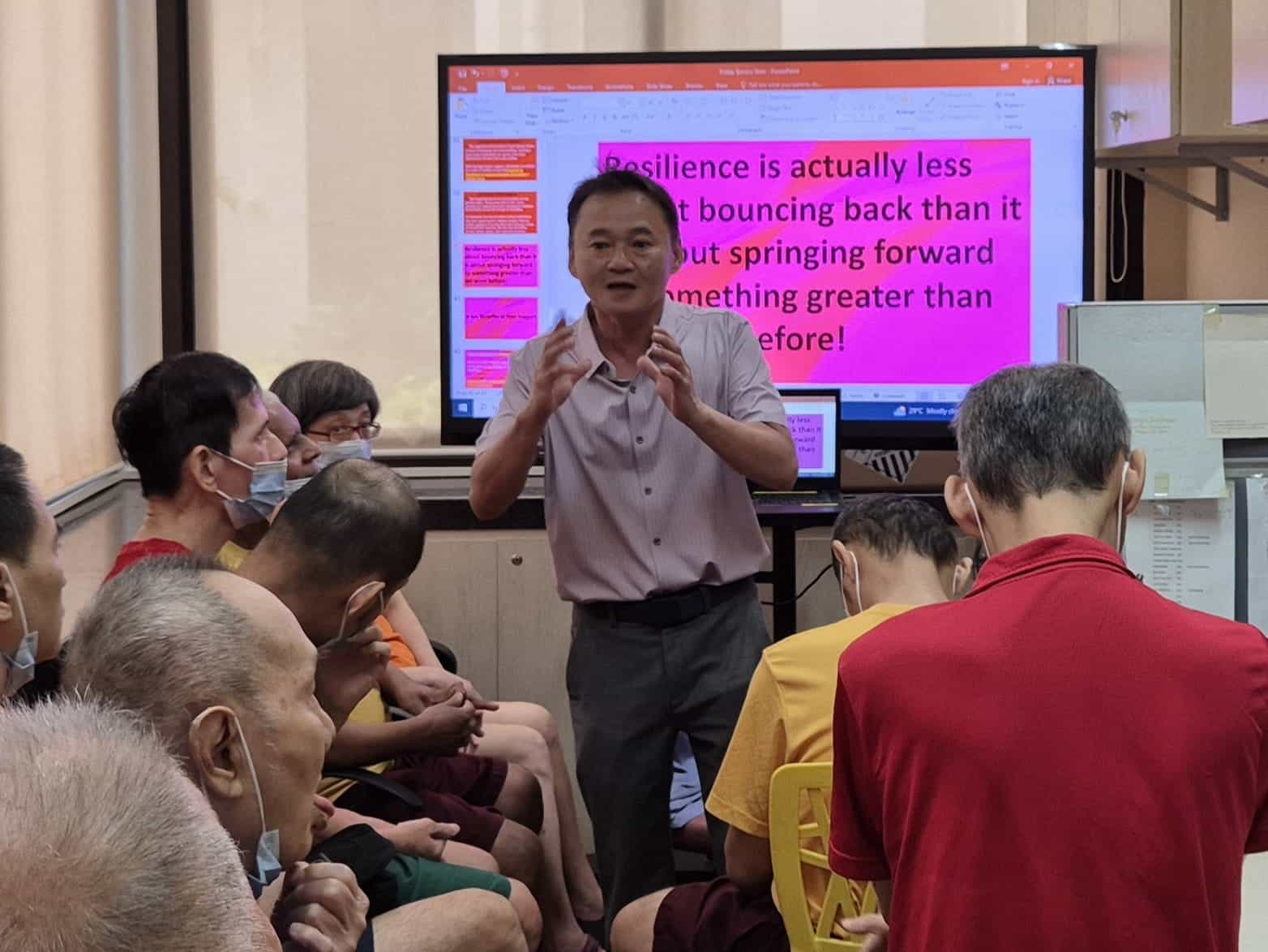How to talk to your kids when bad things happen: Counsellors share ways to walk youths through traumatic events
by Christine Leow // August 24, 2021, 12:39 pm

Talking is key to helping children process traumatic events. During the conversation, listening, validating emotions and creating a safe space are vital, say counsellors. Photo by Anh Nguyen on Unsplash.
The year 2021 has been a particularly rough one for young people in Singapore, with one traumatic event after another befalling youths.
Just before the Lunar New Year, a 15-year-old died as a result of a fall from height during a school camp.
Two months later, two girls aged 15 and 16 – thought to be good friends – were found at the foot of an HDB flat in an apparent suicide.
“Small traumas, like neglect, can be traumatic to you if you don’t have the resources (to cope with them).”
In July, a 16-year-old collapsed at home after suffering a cardiac arrest six days after his first dose of Covid-19 vaccine.
In the middle of that month, a 13-year-old was murdered in school. His assailant, a 16-year-old, was arrested and charged for the crime. A week later, a 17-year-old died when a basketball backboard structure fell on him.
All this happened against a backdrop of unprecedented uncertainty and change that young people have already had to endure for several months because of the pandemic.
What can the caring adults in their lives – parents, teachers, church leaders – do to walk young people through trauma or even to prepare them?
What is trauma?
“Trauma is the subjective, individualised response to an event, series of events, or set of circumstances that is experienced as physically, or emotionally, harmful or life threatening.
“Trauma is quite multi-faceted. It is basically any stressor that your own resources can’t cope with,” said Bettina Yeap, Principal Counsellor at the Mental Health Department (Insight) of Care Corner.
Some traumas are easily identifiable: Major losses like death, tragedies such as accidents and murders, and prolonged abuses. Bettina, 42, calls them “big traumas”.
“It can be the same event but not everyone gets traumatised. It depends on how you interpret it, process it.”
“But there are small traumas which can be traumatic to you if you don’t have the resources (to cope with them), Neglect, for example, can be traumatic.”
Family life educator Gary Koh, 50, agreed that “how a person processes that trauma” is important and it may vary from person to person.
“Any significant event that will hamper their daily functioning can be considered traumatic,” he said.
When a traumatic event happens, it comes as a shock to the person, explained Bettina.
“It takes time for the shock to set in. After the shock comes denial.
“If you don’t process it, it just comes back to you down the road. Then, you realise that this has impacted you.
“That’s why defining trauma is tricky because it can be the same event but not everyone gets traumatised. It depends on how you interpret it, process it and what resources you have for coping.”
How do we protect our children from being traumatised?
Much as we try, there is only so much we can do to protect our children from bad things. But, we can equip them with the resources to cope when bad things happen so they will not be as traumatised.
Here are the counsellors’ tips to fortify children and young people against traumatic events before they even encounter them.
1. Know your child
Temperament plays a part, agreed the counsellors.
Said Bettina: “Those who are more empathetic, more tuned in to feelings, may be more vulnerable to the things around. Sensitive children are more easily affected. They pick up other people’s emotions more quickly.
“If they don’t have anybody to process it with and don’t verbalise it, it will stay inside.”
2. Reduce negative exposure
For the sensitive child who is easily by affected things around, Bettina suggested reducing stimulation.
“Reduce social media intake, reduce the images, even out in the crowd where they pick up signs and emotions and can’t handle it.”
3. Keep communication lines open
Traumatic events need to be processed and the processing begins with getting children to verbalise what they are going through. This allows adults around them to correct any wrong thinking, said Bettina.
That is why keeping communication lines open at home is so important.
Said Joseph Eio, 40, Deputy Director, Care Corner Mental Health & Counselling Services: “Have regular conversations so that they can talk to you when things happen.
“Create pockets of check-ins, special times so you can talk.”
“And when you talk to them, don’t nag.”
Joseph shares songs and interesting news events with his children as conversation starters.
Bettina suggested having the talks in “non-threatening environments”.
“Go for a meal, go for a run, go for one-on-one dates with your child. Car rides are quite good opportunities, too.
“Create pockets of check-ins, special times so you can talk.”
By the teen years, keeping the communication lines open may simply mean providing an ongoing presence.
“So that when he feels like he wants to talk, he knows you are there,” said Gary.
4. Discuss possible scenarios
Prepare them for the worst ahead of time.
Said Gary: “As ‘what if’ questions. What if someone offers you drugs? What if you witness a terrible accident?
“Then, give them resources on how to cope, where they can turn to for help or guidance. Help them create a data base to know what to do when that situation arises.
“Share from your own challenges and setbacks. Being real with them lets them see that parents also struggle and makes the struggles normal.”
5. Surround them with a support system
Give them social resources to cope.
“The family is one social resource. As a parent, I need to make sure I am a safe enough place where my child can come to,” said Bettina.
Relatives and older siblings, even close family friends can be roped in as well.
“As your kids grow older, they may not want to talk to you. Surround them with healthy and trusted adults.
“If your child is close to another person, be glad that your child has someone to talk to, even though you may mourn the loss of them not talking to you.”
“As your kids grow older, they may not want to talk to you. Surround them with healthy and trusted adults.”
Joseph and his wife encourage their children, a son aged 12 and a nine-year-old daughter, to develop strong bonds with a teen whom they trust with the hope that the older youth will be another person to whom their children can turn in times of trouble.
Added Gary: “I recently asked my son: ‘If you encounter self-harm, would you talk to us?’ He said, ‘No.’
“And this is when we have a decent relationship. In their minds, they don’t want to trouble their parents.
“So then, create a list of people they can always turn to. If you can’t talk to your parents, would you like to see the school counsellor, a pastor?”
6. Build internal resources
Internal resources are important as well. Let your child know he has resources within him to cope.
Bettina said: “I would tell the child, ‘You are caring. That is why you care for others.’ Or I say, ‘Though you didn’t want to do it, you still did it. What do you think it says about you?’
“They struggle because they are not used to saying good things about themselves. So, as parents, if you are able to do that from young, they will see what is good about them.
“Allowing our kids to face challenges is part of resilience building.”
“Then, you can tell them, ‘Remember you have these resources so that no matter where you are, you have these.’ Highlight these resources to them.”
One exercise Bettina uses to get a person to see his internal resources is to get them to ask three people to identify his strengths. Joseph suggested asking them to talk about the meaning of their names.
“It’s a positive booster that their names have such significance.”
There are also ways to build up internal resources.
“One way is to teach them that failure is not final. Setbacks will come to all of us. If we never experience failure, we will never learn resilience.
“So, allowing our kids to face challenges is part of resilience building. Sometimes we intervene too early,” said Gary.
Instead of stepping in immediately, Gary advocated asking questions: “What happened? How can you deal with this?”
7. Rely on spiritual resources
“Go back to helping them understand their significance is in God, and not their accomplishments, that they have a God who loves them more than we can,” said Gary.
Through modelling godly behaviour, family devotions, praying together, help them to “encounter God themselves so that they can disconnect from their father’s faith to connect to God on their own”, Gary said.
How do we know if our child is traumatised?
Bettina offered some reactions to trauma that parents can watch out for:
Physical
- Fatigue or exhaustion
- Headaches, stomachaches
- Muscle tension
- Increased heart rate
- Hypervigilance or a state of “high alert”
Emotional
- Strong emotions such as sadness, fear, panic, anxiety, anger, guilt, helplessness
- Feeling shocked, confused, detached, numb
- Loss of interest in school, family, friends, hobbies.
Cognitive
- Replaying or constantly thinking about the traumatic event
- Difficulty concentrating and making decisions
- Memory disturbances
- Constant worrying
- Pessimistic outlook on life
Behavioural
- Disturbed sleep
- Changes in appetite
- Avoiding reminders of the event
- Withdrawing from others
- Lashing out at others
“Everybody experiences trauma differently. There is no definite set of responses,” Bettina cautioned.
“Just look out for any difference in your child. See if he is acting a bit differently from usual.”
If some of the symptoms persist over two to three months, take the initiative to start a conversation about it, she added.
“Rather than think this will pass, take preventive measures.”
How do we help them to manage trauma?
“When there is trauma, brain circulation changes. Thankfully, we have neuroplasticity so there is a chance to rewire our brains and create new circuits,” said Bettina.
Helping children process the trauma, either experienced or witnessed, prevents negative effects from setting in.
1. Initiate talk
A key part of processing is talking things through.
“When you recognise that something has happened, initiate a conversation. Say, ‘I was just wondering what your thoughts and feelings about this are? Are your friends talking about this? How are they affected by this?’”
2. Draw boundaries
Some children are so sensitive that even hearing about traumatic events can affect them.
Said Bettina; “For such children, draw boundaries about which pain is theirs and which is someone else’s. Help them to recognise that ‘you are you, but they are them’. Say, ‘It is good that you feel for them. But recognise that this pain is not yours.’
“Then, help them find somewhere to put the pain. Give them options to deal with it to reduce the feeling of powerlessness.
“Ask then, ‘Can you choose not to do anything about it? If you want to do something, what would it be?’”
3. Listen & observe
During the conversation, listen more. This is especially so with older children.
Said Bettina: “Teens won’t talk if they don’t feel safe or listened to or understood.
“If you talk, they feel that you are shutting them down, dismissing them or minimising their feelings. Then, they will feel there is no point talking.”
So, hold off the advice or solutions for the moment.
“Instead, take a posture of curiosity. Ask questions. This will force the person to organise and consolidate his thoughts and feelings.”
Agreed Gary: “We are like detectives trying to figure out what is going on. You get the first story – ‘I hate school. School is such a waste of time.’ But what is really going on?
“Take a posture of curiosity. Ask questions.”
“Ask questions to get the real story. ‘My Physics teacher is constantly berating me.’ That is the second story.
“Learn to explore rather than take the first answer.”
Even if what they share is shocking or goes against your values, remain calm, said Bettina.
“You may panic inside but don’t show it outwardly. Instead, ask more questions to mine for more information.”
Part of listening is also empathising with the person’s emotions and validating those feelings.
Then, assure them that they are in a safe space and that you are there for them. That assurance is important.
“After this, you might have a bit of personal sharing about your own experiences and how you managed things,” said Bettina.
Watch out for non-verbal cues.
Said Bettina: “If they are fidgeting, their leg is shaking, reflect together on the reaction so that they can pay attention to it.
“Ask, ‘How are you feeling as you talk about this?’ Or say, ‘You seem really tense. What is happening?’”
4. Create emotional vocabulary
Being able to name their emotions helps in the processing of traumatic events. The counsellors recommend the use of an emotions wheel or emotions cards to help children label their feelings.
“Being able to label an emotion helps with the regulation. When we can pick out the emotion, we can explore it,” said Bettina.
5. Provide outlets for release
Gary said that, depending on the age and temperament of the child, cuddles can be a very good way of processing traumatic events.
“If they can’t or won’t talk, art therapy can help, too,” he added.
“As they draw, you can ask them, ‘Tell me about this.’ When they describe what they draw, they are telling you something.”
Going outdoors – walks, exercising – can boost endorphins as well.
“Even playing with bubble wrap can have a calming effect.”
6. Correct perceptions
Once rapport is established and they know they are being heard, parents can challenge or correct wrong interpretations of the traumatic events.
“For example, in a divorce, children often feel it is their fault. Parents have to step in to say, ‘This is something between the adults.’” explained Bettina.
Bringing in the Bible can help but “timing is crucial”.
“Being too quick to quote the Bible may seem like Bible-bashing. They may think, ‘Don’t you think I know this? But I am still struggling. So, what you are saying doesn’t resonant with my experience right now.’
“You need to pray for wisdom about when to bring them back to the Truth.”
7. Help regain control
“When trauma happens, things feel out of control. So, ask, ‘What do you want to do about that?’” said Bettina.
This may involve writing a note, praying for the people or a physical act.
Sharing the story about a boy who had witnessed 9/11, she said, “His therapist engaged him in play and art therapy and asked, ‘What would you put in this drawing to make it better?’
“The boy drew in a trampoline. It’s about tweaking the memory so that when it is consolidated, it is something different.”
8. Model right responses
“As an adult, your clarity on what is happening for yourself is important,” said Bettina.
Work out your own responses to the trauma first so you are “not overwhelmed by emotions or they will pick it up”.
“Then, you can model how to feel certain things and how to manage them. Parents are co-regulators. There is no self-regulation without co-regulation.”
Salt&Light Family NIght: How do I talk to my child about traumatic events?
A tragedy happens in school.
A schoolmate dies unexpectedly.
There is chaos and upheaval at home or in your child’s world.
When these things happen, how do you walk your child through the trauma? Are there ways to equip them so they will not be easily shaken? How can we even tell if they have been traumatised?
Join hosts Carol Loi and Alex Tee as well as panellists:
- Joan Swee, counsellor and grief recovery specialist, and founder of Whispering Hope
- Reverend Chan Mei Ming, Assistant Pastor at Faith Methodist Church
- Dr Ken Ung, senior consultant psychiatrist at Adam Road Medical Centre who specialises in adolescent psychiatry
as they provide handles to manage children and teens when they encounter traumatic events.
Date: August 31, 2021
Time: 8.30pm-10pm
Cost: Free
Register at: http://bit.ly/SLFamilyNight31August
About the Organiser:
Satl&Light is a Christian news digital platform where believers can unite in spirit and purpose to see God in the 9-to-5, to influence and to impact, to find meaning in the mundane and to wrestle with doubt and despair in faith – and find amazing grace for the journey ahead.
About the Hosts:
Carol Loi is the International Director of Generations of Virtue, a ministry committed to transforming culture, one family at a time. She runs a social enterprise Village Consultancy that provides digital literacy education as well as John Maxwell Certified training on leadership & family life. She and her husband are raising two teenagers.
Alex Tee is a former banker who left the corporate world to home-school his three young children. His deepest desire is to prayerfully raise children who seek first the kingdom of God and His righteousness. He is part of the Elijah 7000 group of fathers who meet every Saturday at dawn to intercede for families and the nation.
RELATED STORIES:
The heartbreaking truth about the emotional state of our youths – and how we can pray for them
We are an independent, non-profit organisation that relies on the generosity of our readers, such as yourself, to continue serving the kingdom. Every dollar donated goes directly back into our editorial coverage.
Would you consider partnering with us in our kingdom work by supporting us financially, either as a one-off donation, or a recurring pledge?
Support Salt&Light


